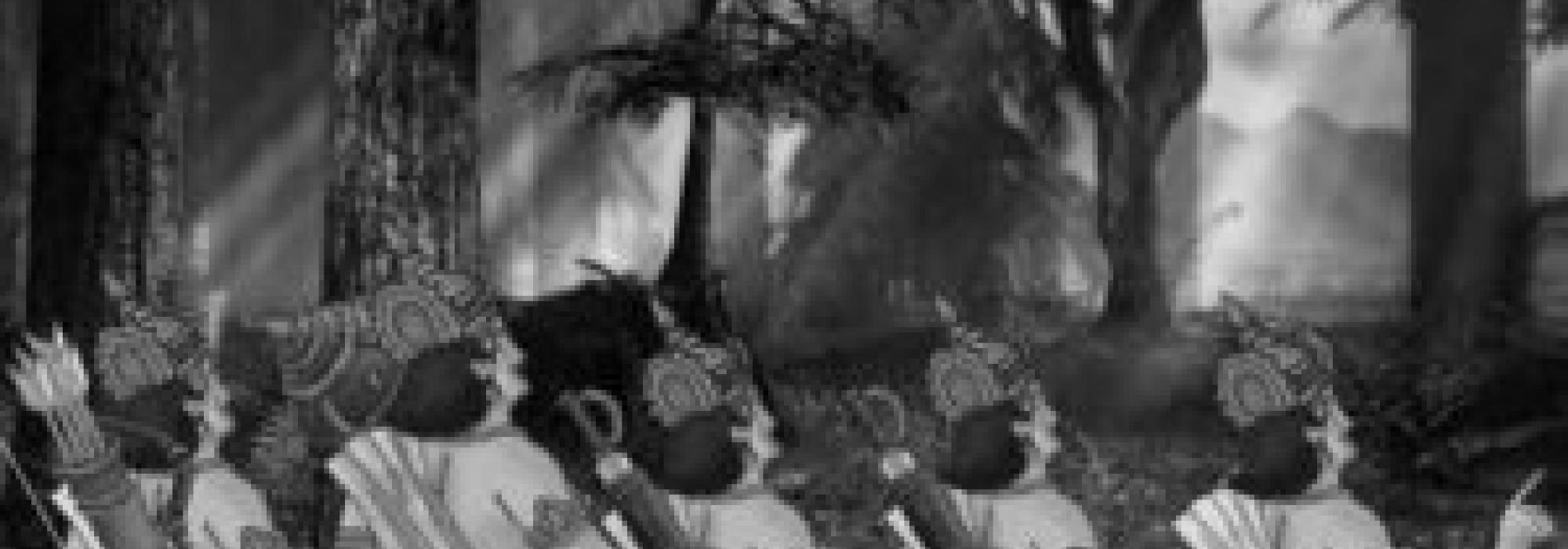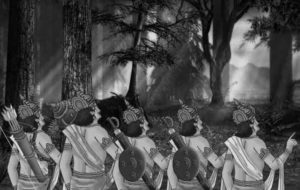Draupadī said, “I am not denigrating dharma nor am I criticizing the Supreme; I'm just lamenting about my difficulties. The fruit of the action manifests itself only through karma, not through dharma; a man who falls asleep, entirely dependent on fate gets destroyed like a green pot kept in water. A capable man should not sit idle and silent for a long time, like one who is helpless. If one lacks competence, the fruits of his actions might be limited or he may not get anything; but one who doesn’t engage himself in action neither gets competence nor the fruits. A human being should never disown himself; such a person never finds peace.”
Listening to these words of Draupadī, Bhīmasena lost his patience. He heaved a sigh and told Dharmarāja, “Brother! Regain the kingdom by treading the path of dharma! What’s the use of living in the forest without dharma, artha, or kāma – what do we get by this? Duryodhana did not conquer our kingdom either by the path of dharma, or the path of integrity, or the path of valour. He obtained our kingdom by cheating at dice. Falling for your words, I did not slay the Kauravas then – even now we are burning for it! None of us are agreeable to roaming about in the forest like animals. You are always giving the excuse of dharma, dharma! You embrace ahiṃsā even when we are endowed with valour, strength, and courage; and you’re unable to see the catastrophe arising from this. The Kauravas deem your attitude of forgiveness as weakness; this is a saddening situation; I would not feel so sad even if they kill us in battle. One should not always cling on to dharma alone; one must adhere to dharma, artha, and kāma; in order to tread the path of dharma, we need artha; we cannot obtain that artha by means of begging; more so, that is not kṣatriya-dharma; indeed, wealth should be gained by strength alone. Therefore, let go of this fragility and hold on to kṣātra (spirit of valour and protection). A man who has only adhered to dharma has never ruled a kingdom, nor gained wealth, nor enjoyed prosperity; who starts a business that is not profitable? Such a business is like scratching a donkey’s body! A wise man is one who lets go of petty dharma and holds on to a grand dharma. Therefore, let us launch an attack on the Kauravas. We have Pārtha’s Gāṇḍīva bow; there’s my mace – there are neither elephants nor horses nor heroes who can stand facing those. For our support we have the Sṛñjayas, the Kekayas, and also Kṛṣṇa; therefore, in the war we will surely obtain both victory and kingdom!”
Yudhiṣṭhira said, “Bhīma! Your words prick me, just like my upper garment. But what you say is true. I won’t find fault with you for speaking so, for it is because of me that all of you are suffering thus. I gambled so that we can obtain the kingdom; but Śakuni cheated; well, what was meant to happen happened. Can we break the promise that we’ve made in front of the elders merely out of our desire for the kingdom? Therefore, wait for the time when we shall find peace again. To me, dharma is more than life itself; royal treasure, children, fame – all these will not weigh even as much as a small part of dharma.”
Bhīma said, “Brother! You speak as if you’ve made a treaty with the bird of Time with a deadly form! One who has limitless age or one who knows beforehand his lifespan can sit down and wait for the tides of time! But is there a person like that? As for man, he has death within his body. If we sit and wait for thirteen years, our life will be spent and death will be near. So let us regain our kingdom before death pays us a visit! A person lacking in sattva and determined effort, who cannot suitably react to enmity – such a human life is a waste! You have golden shoulders; use that to kill enemies in war and obtain wealth! A trouble that is swallowed quietly is worse than raging fire; experiencing such trouble day and night will rob me of sleep; Arjuna too is boiling within, like a lion trapped in a cave. Nakula-Sahadeva and the vīramātā Draupadī have all become lifeless and silent merely because they want you to be at peace. Friends and relatives too desire only for your happiness. The only two people suffering here are Draupadī and I! Without reason, you’re stressing yourself in the name of compassion and ahiṃsā; nobody will praise this. Compassion is the natural trait of a brāhmaṇa; this being the case, how were you born as a kṣatriya? Your attempt at putting masks on our faces is like desiring to cover the Himalayas with a blade of grass! How will you manage the one-year incognito period? Is it possible for the sun shining in the sky to be incognito? Is it possible for the Airavata-like Arjuna? Is it possible for Nakula-Sahadeva—who are like lion cubs—to roam about freely without getting recognized? How can Draupadī, a vīramātā and famous princess, be in hiding? All the people of the world know me from my childhood. Therefore, you’ll find that trying to keep me in hiding will prove as difficult as covering up the Meru mountain. Further, the several kings that we defeated are now with the Kauravas and will live as their vassals. They will send several spies to ferret us out; and if we are found out, the result will be catastrophic. It has been thirteen months since we’ve come to the forest; consider that equal to thirteen years. If you so desire, we shall find a cow and give it fodder; that will absolve us of all our sins! Gives us consent to kill our enemies! A kṣatriya knows no other dharma but war!”
Upon listening to Bhīmasena’s words, Yudhiṣṭhira heaved a sigh, thought for a moment, decided what must be done, and then told him, “Bhīma! What you say is true; but I will say something else; listen to that. Those with a rash and reckless attitude who commit sin, in the end they become targets for pain and sorrow. One achieves success if he undertakes—after careful contemplation and discussion—activities that are courageous and aligned to dharma; even fate will be favourable to such an undertaking. Swelling with strength and motivated by agitation, you want to take up such a task. Listen to my opinion; Bhīṣma, Droṇa, and others are great warriors, brave heroes, and experts in weapons and warfare; they will support the Kauravas; the kings whom we defeated have earned Duryodhana’s friendship and are keen to protect him; Duryodhana has given them many rewards and honours, thus keeping them happy; and so, they will be ready to even lay down their lives for him. Bhīṣma, Droṇa, and Kṛpa have the same feelings for both (Pāṇḍavas and Kauravas) but to pay their food-debt they will be ready to fight until their last breath in a war. Karṇa is always impatient and over-enthusiastic; he too knows the science of weapons and wears an impregnable armour; without killing all these people first it is not possible for you go and kill Duryodhana. Thinking about these great archers and the dexterity of Karṇa’s hands, I too am losing sleep, Bhīma!” Upon hearing these words, Bhīma too was overcome by anxiety and fear; then he didn’t speak another word.
Some time after this episode, Dharmarāja called Arjuna and took him aside; having made him sit down, with a smiling face Dharmarāja patted his back and spoke words of solace: “Arjuna, look, in archers like Bhīṣma, Droṇa, Kṛpa, Karṇa, and Aśvatthāma, the art of archery has established itself firmly on four legs. They are wholly learned in the use of all the astras including the brahmāstra, divine astras, and demonic astras. Duryodhana treats them as gurus and has kept them satisfied with wealth and honour. He treats warriors as nobility. The entire earth is under his sway. All of us have trusted you alone and placed the entire burden on your back. Now you must do as I say. By rigorous tapas you must impress the devas; wear the clothes befitting a sage, take your bow, quiver, arrows, sword, and other weapons and travel northward. Indra has all the divine weapons. The devas had given it to him to destroy Vṛtrāsura. Therefore, if you approach Indra, you will get all the divine weapons in one place; and he will give it to you!” Arjuna agreed and was about to depart when Kṛṣṇā looked at him and said, “Pārtha! What Kuntīdevī expected of you when she gave birth to you, all that you desire in your heart – may you obtain everything! Cursed is this kṣatriya birth – let it not happen to anyone! How fortunate are the brāhmaṇas, for their profession is not war! Until you return, we shall spend all our waking hours singing praises of your heroism. During this long journey of yours, none of us need any comfort or joy; have a peaceful journey and return safely; may all be well with you!” Within a day of his departure, he reached the Himalayas. From there, walking several days and nights, crossing the Himavat mountain, Gandhamādana mountain, and several forts, he reached Indra’s abode. There, he felt he heard a voice in the sky that said, “Stop!” When he turned and saw around, under a tree he saw a great ascetic, with matted locks, who was shining with divine light. He looked at Arjuna and said, “Who are you? You’ve come here like a kṣatriya, holding knife, armour, bow, and arrow. This is the residence of peaceful brāhmaṇa ascetics; here, weapons have no work. Abandon them!” These words did not shake Arjuna in the least. Upon seeing his courage and determination, the brāhmaṇa was overcome by affection; with a soft smile he said, “What boon do you desire, young man? I’m Indra!” As soon as he heard these words, Arjuna offered his salutations to him with joined palms and said, “O great deity! I have come here to learn the science of weapons from you; the only boon I desire is that!” Indra said with a smile, “After having come here, what will you gain by learning about these weapons Arjuna? Ask for the divine worlds!” Arjuna said, “Devarāja! I desire neither divine worlds, nor divinity, nor the lordship over the divine worlds. Having left my brothers in the forest and not giving a befitting reply to my enemies, if I desire for these things, then in every world at all times I will get a bad name!” Indra was pleased. He said, “Let it be as you desire, my son! I will give you all the weapons. But before that, pay a visit to the Śūla-weilding Śiva. By his grace, you will return an accomplished soul, capable of entering heaven!” Saying so, Indra disappeared.


















































